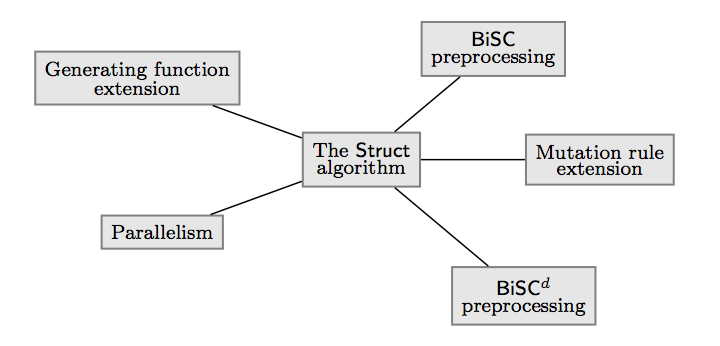PhD fellowships in Algorithms for Permutation Structures
01 Jan 2014 - Henning
Applications are invited for Ph.D. positions at the School of Computer Science (SCS), Reykjavik University (RU), funded by a project grant from the Icelandic Research Fund, under the direction of Michael Albert (University of Otago), Anders Claesson (University of Strathclyde) and Henning Ulfarsson (Principal investigator, Reykjavik University). The application deadline is March 31, 2014.
Supervised by Michael Albert (University of Otago), Anders Claesson (University of Strathclyde) and Henning Ulfarsson (Principal investigator, Reykjavik University).
Research project
 The study of permutation patterns is a very active area of research and has
connections to many other fields of mathematics as well as to computer science
and physics. One of the main questions in the field is the enumeration problem:
Given a particular set of permutations, how many permutations does the set have
of each length? The main goal of this research project is to develop a novel
algorithm which will aid researchers in finding structures in sets of
permutations and use those structures to find generating functions to enumerate
the set. Our research interests lead also into various topics in discrete
mathematics and computer science.
The study of permutation patterns is a very active area of research and has
connections to many other fields of mathematics as well as to computer science
and physics. One of the main questions in the field is the enumeration problem:
Given a particular set of permutations, how many permutations does the set have
of each length? The main goal of this research project is to develop a novel
algorithm which will aid researchers in finding structures in sets of
permutations and use those structures to find generating functions to enumerate
the set. Our research interests lead also into various topics in discrete
mathematics and computer science.
Your assignment will primarily be development of the theory of permutation patterns relating to the new algorithm as well as implementation of the algorithm.
Research group
The leaders of the project all have extensive experience in the study of the theory of permutation patterns and have all implemented software packages that have successfully been used by other researchers in the field. Successful applicants will join a group of undergraduate and master’s students at Reykjavik University studying permutation patterns.
Qualification requirements
Applicants for the PhD fellowships should have a good MSc degree in Computer Science, Mathematics or closely related fields, and have a strong background in discrete mathematics. Some previous knowledge of topics from at least one of permutation patterns, enumerative combinatorics and Algorithms is not a prerequisite, but would be desirable. Self-motivation, open mind and team spirit are all helpful ingredients.
Application details
By Monday, March 31, 2014, interested applicants should send their CV, including a list of publications where applicable, in PDF to the addresses below, together with a transcript of their academic record, a statement outlining their suitability for the project and the names of two referees.
Henning Ulfarsson (email: henningu@ru.is)
Michael Albert (email: malbert@cs.otago.ac.nz)
Anders Claesson (email: anders.claesson@cis.strath.ac.uk)
We will start reviewing applications as soon as they arrive, and will continue to accept applications until the positions are filled. However, we strongly encourage interested applicants to send in their applications as soon as possible.
Renumeration
The salary is 290.000 ISK per month (roughly 1.800 euros) for Ph.D. students. There is no teaching duty, but teaching opportunities exist for additional salary. Some funding for travel is available. The Ph.D. positions are for three years. Start date is flexible.
About the School of Computer Science at Reykjavik University
The School of Computer Science at RU has approximately 900 students at the undergraduate, masters and doctorate levels. The School is home to several strong research groups and the main research areas are algorithms, artificial intelligence, combinatorics, concurrency theory, databases, human-computer interaction, natural language processing, engineering software systems, theoretical computer science and virtual environments. The school offers joint Ph.D. programs with Ph.D. degree programs with KTH, Stockholm, Sweden, and Eindhoven University of Technology, Holland. For more information about Ph.D. studies see PhD studies.
The successful candidates will benefit from, and contribute to, the research environment at the Icelandic Centre of Excellence in Theoretical Computer Science (ICE-TCS). ICE-TCS has currently 10 permanent members, three postdoctoral researchers and three Ph.D. students. For more information about ICE-TCS, its members and its activities, see the ICE-TCS website.
About the surroundings
As a sparsely populated volcanic island in the midst of the North-Atlantic, Iceland offers unsurpassed opportunities for seeing nature at work, with its mix of glaciers, hot springs, lava fields and expanses of lunar-like landscape. Reykjavik has a vibrant cultural scene that is seldom seen in cities of its size. Reykjavik University is located on the south shore of the city, next to a heated beach and a park.